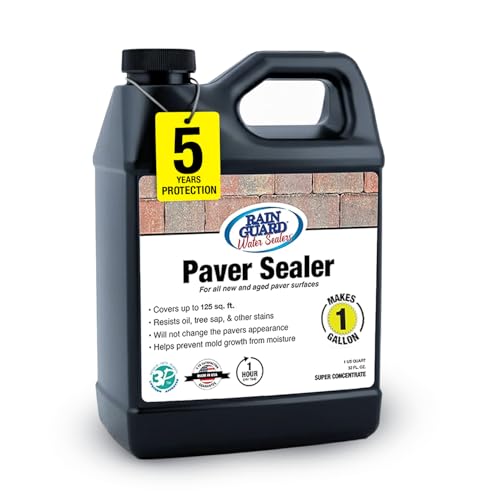Living in Florida means enjoying sunny days, tropical landscapes, and outdoor living year-round. One common debate among homeowners in the Sunshine State is whether pavers should be sealed. We all want our outdoor spaces to look pristine and withstand the unique challenges of Florida’s climate.

In this article, we’ll explore the benefits of sealing pavers in Florida, from protecting them against UV rays to preventing mold and mildew growth. Join us as we delve into the reasons why sealing your pavers could be a wise investment for maintaining the beauty and longevity of your outdoor surfaces in Florida.
Benefits of Sealing Pavers in Florida
As landscape designers, we understand the importance of preserving the beauty and durability of outdoor spaces. Sealing pavers in Florida offers a range of advantages that can enhance the longevity and aesthetics of your outdoor surfaces, making it a worthwhile investment for homeowners in the Sunshine State.
Protection Against Harsh Weather
Sealing your pavers provides essential protection against the intense Florida weather conditions. The sealant acts as a barrier, shielding the pavers from the damaging effects of UV rays, extreme heat, heavy rainfall, and humidity. By sealing the pavers, we help to prevent premature fading, cracking, and deterioration, ensuring that your outdoor surfaces remain vibrant and structurally sound even in the face of Florida’s challenging climate.
Prevention of Mold and Algae Growth
In Florida’s humid environment, mold and algae growth can quickly take hold on unprotected pavers, leading to unsightly stains and potential slip hazards. Sealing the pavers creates a moisture-resistant surface that inhibits the growth of mold, mildew, and algae. Our sealant not only preserves the cleanliness and safety of your outdoor spaces but also reduces the need for frequent and intensive cleaning, saving you time and effort in maintenance tasks.
Enhanced Color and Aesthetics
When pavers are left unsealed in Florida, their colors can gradually fade due to sun exposure and weathering. By applying a sealant, we help to lock in the vibrant hues of the pavers, enhancing their overall color and aesthetics. The sealant provides a glossy finish that brings out the natural beauty of the pavers, making them more visually appealing and complementing the design of your outdoor areas.
Sealing pavers in Florida is a smart choice for homeowners looking to protect their outdoor surfaces from the elements, maintain a clean and attractive appearance, and ensure the long-term resilience of their landscapes. Trust us to seal your pavers and enjoy the numerous benefits that come with this essential maintenance practice tailored to Florida’s unique climate.
Considerations Before Sealing Pavers
As landscape designers, we understand the importance of considering various factors before sealing pavers in Florida. Proper planning ensures that the process is effective and yields long-lasting results for outdoor spaces.
Types of Sealants Available
When it comes to sealing pavers, there are different types of sealants to choose from, such as acrylic-based sealers, water-based sealers, and solvent-based sealers. Each type offers unique benefits and considerations based on factors like durability, appearance, and maintenance requirements.
For instance, acrylic-based sealers provide a glossy finish and can enhance the color of pavers, making them ideal for areas that require a vibrant look. On the other hand, water-based sealers are eco-friendly options that offer good UV protection and are easier to apply. Solvent-based sealers, while durable, may emit strong odors during application and require careful handling.
Paver Material and Porosity
The material and porosity of pavers play a crucial role in determining the effectiveness of sealants. Different materials, such as concrete, brick, or natural stone, have varying levels of porosity, affecting how well they absorb sealants.
For example, concrete pavers are more porous than brick pavers, which means they may require multiple coats of sealant to achieve the desired level of protection. Natural stone pavers, like travertine or limestone, may need specialized sealants to maintain their natural beauty and integrity.
Before sealing pavers, it’s essential to assess their material and porosity to select the appropriate sealant that will provide the necessary protection while enhancing the aesthetics of the outdoor space.
Timing and Weather Conditions
Choosing the right time to seal pavers is crucial for optimal results. Ideally, we recommend sealing pavers during periods of mild temperatures and low humidity to allow the sealant to dry and cure properly.
Avoid sealing pavers during extreme weather conditions, such as heavy rain or intense heat, as these can affect the bonding and drying process of the sealant. It’s best to plan the sealing process when the weather forecast predicts stable conditions to ensure the sealant adheres effectively and provides the desired level of protection.
Considering these factors before sealing pavers in Florida will help homeowners make informed decisions and maintain the beauty and longevity of their outdoor surfaces.
The Sealing Process Explained
Cleaning and Preparing the Pavers
When it comes to sealing pavers in Florida, our first step is always thorough cleaning and preparation. Before sealing, we ensure that the pavers are clean and free of any dirt, grime, or stains. This step is crucial as it allows the sealant to adhere properly to the pavers, providing a strong and long-lasting finish.
Applying the Sealant
Next, we move on to applying the sealant. We carefully select the appropriate sealant based on the paver material and porosity. In Florida, where the weather can be quite unforgiving, choosing the right sealant is essential for protecting the pavers from UV rays, mold, and harsh weather conditions. We make sure to apply the sealant evenly, covering the entire surface of the pavers for uniform protection.
Drying and Curing Time
After applying the sealant, we allow sufficient time for drying and curing. This step is crucial to ensure that the sealant sets properly and forms a strong bond with the pavers. In the humid climate of Florida, allowing adequate drying and curing time is essential for achieving the best results. We always follow the manufacturer’s instructions regarding drying times to guarantee optimal sealing outcomes.
« Say goodbye to pesky moss on your pavers with these easy steps Shocking Truth Revealed: The Surprising Time It Takes for Pavers to Cure »
By following a meticulous sealing process that includes cleaning, selecting the right sealant, and allowing adequate drying time, we ensure that the pavers in Florida are effectively protected and maintain their beauty for years to come.
Maintenance of Sealed Pavers
As landscape designers, we understand the importance of proper maintenance to ensure the longevity and beauty of outdoor spaces. When it comes to sealed pavers in Florida, routine cleaning is key to preserving the quality of the sealant and the pavers themselves.
Routine Cleaning
To maintain sealed pavers, regular cleaning is essential. We recommend sweeping the surface regularly to remove debris and prevent dirt buildup. Additionally, using a mild detergent and water to wash the pavers can help eliminate stains and keep them looking fresh.
Pressure washing can be effective for a deeper clean, but it’s crucial to adjust the pressure to avoid damaging the sealant. We advise using a fan tip nozzle and keeping the pressure below 3,000 psi to protect the pavers’ surface.
Reapplication of Sealant
Over time, the sealant on pavers may wear off due to exposure to UV rays and foot traffic. As part of maintenance, we suggest inspecting the pavers annually to assess the condition of the sealant. If signs of wear are visible, reapplying the sealant can help restore protection and enhance the pavers’ appearance.
When reapplying sealant, proper cleaning and preparation are vital to ensure adhesion and effectiveness. Thoroughly clean the pavers, allow them to dry completely, and follow the manufacturer’s instructions for applying the new sealant. By maintaining a regular schedule for resealing pavers, you can extend their lifespan and keep your outdoor spaces looking beautiful.
Pros and Cons of Sealing Pavers
Longevity and Durability
When it comes to the longevity and durability of sealed pavers in Florida, we’ve seen significant benefits. Sealing pavers can extend their lifespan by protecting them from the harsh Florida sun and intense weather conditions. The sealant acts as a barrier against UV rays, preventing color fading and surface deterioration over time. By forming a protective layer, sealed pavers are less susceptible to cracks, chips, and erosion, ensuring they maintain their structural integrity for longer periods.
However, it’s essential to note that while sealing pavers can enhance their durability, there may be some considerations to keep in mind. In high-traffic areas or places with heavy furniture, the sealant might wear off more quickly, requiring more frequent resealing to maintain optimal protection. Additionally, improper installation or lack of maintenance can compromise the effectiveness of the sealant, potentially leading to issues like discoloration or uneven finishes.
Cost Implications
Regarding cost implications, sealing pavers in Florida can be both a cost-effective investment and a potential expense. Initially, the cost of sealing pavers may seem like an additional expense; however, when we consider the long-term benefits, it can actually save money in the future. Sealing pavers can reduce the need for extensive repairs or replacements due to damage caused by UV exposure or moisture infiltration, ultimately saving on maintenance costs over time.
On the flip side, there are factors that can impact the overall cost of sealing pavers, such as the size of the area to be sealed, the type of sealant used, and the frequency of resealing required. While sealing pavers can be a worthwhile investment for preserving their appearance and structural integrity, it’s essential to weigh the initial cost against the long-term benefits to determine the overall value for your specific outdoor space.
Environmental Concerns
In terms of environmental concerns, the decision to seal pavers in Florida requires careful consideration of the ecological impact. While sealing pavers can offer protection against mold, algae, and other environmental factors, some sealants may contain chemicals that can be harmful to the environment if not applied or disposed of properly. As responsible landscape designers, we always recommend selecting eco-friendly sealants that are low in volatile organic compounds (VOCs) to minimize environmental impact.
It’s important to strike a balance between the benefits of sealing pavers for durability and aesthetics and the potential environmental consequences of using certain sealants. By choosing environmentally friendly sealants and following proper application and disposal practices, we can ensure that sealing pavers in Florida not only enhances outdoor spaces but also minimizes our ecological footprint.
Conclusion
Sealing pavers in Florida offers a range of benefits, from protection against UV rays and harsh weather to enhancing aesthetics and longevity. It’s a smart investment for maintaining outdoor surfaces and can save money in the long run by reducing repair needs. Considerations like sealant types, paver material, and timing play crucial roles in achieving optimal results. While sealants guard against color fading and erosion, factors such as high-traffic areas and maintenance can influence their effectiveness. Choosing eco-friendly sealants is essential for minimizing environmental impact while enjoying the durability and beauty of sealed pavers. Regular resealing and proper maintenance are key to extending the lifespan of pavers and preserving outdoor spaces. In Florida’s climate, sealing pavers is a practical choice that combines protection, aesthetics, and sustainability.
















